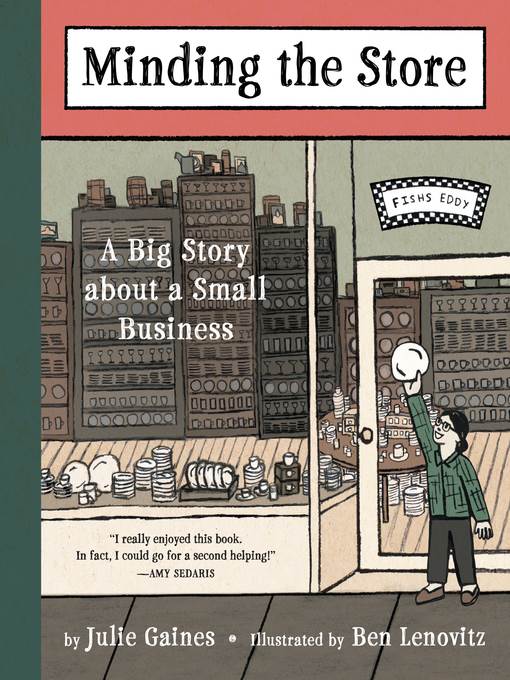
Minding the Store
A Big Story about a Small Business
کتاب های مرتبط
- اطلاعات
- نقد و بررسی
- دیدگاه کاربران
نقد و بررسی

June 25, 2018
Equally a business and family story, this cheerful history opens in the mid-1980s, when Gaines, a recent art college grad, hits it off with store clerk Dave Lenovitz when she stops at a small shop to buy glassware in Lower Manhattan. They both daydream of becoming their own bosses, and serendipitously, they discover a tiny space for rent near Gramercy Park. Together, they open a quirky vintage shop that would become the New York City housewares institution Fishs Eddy (with an ease that seems fairy tale–like when viewed from the contemporary N.Y.C. real estate market). Their stock—mainly vintage paintings, chairs, cabinets and glassware—comes from flea markets. After unearthing a treasure trove of old dinner sets in the basements of local restaurant supply stores, the pair focus on stocking the patterned dishware that becomes the store’s trademark. As Fishs Eddy grows, the couple deal with the challenges of expanding locations and staff, balancing childcare with retail commitments, the tragedy of 9/11, and a family health crisis. Drawn by the founders’ son in a naive crayon line, the art feels unfinished, but also intimate. Avoiding the trap of coming off as an extended advertisement, this tribute pulls off an engaging narrative on the ups and downs of following dreams.

July 15, 2018
Family spirit extends from the beloved housewares-and-curios store to the collaboration on this graphic memoir.New York's Fishs Eddy has become an unlikely retail institution, taking dishes and other artifacts discarded by the restaurant industry and turning them into treasures of Americana. The story of the business--how it got its name, stumbled into its stock, and developed in such haphazard fashion--is told by Gaines, the former art student who started the store with her husband, David Lenovitz, and illustrated by their son, Ben Lenovitz. The latter's artistry would fit fine in the New Yorker, whose readers are likely among the store's loyal customers. But Gaines isn't really a writer, and the story lacks the structure and momentum that generally give such memoirs their punch. The perspective of her co-founding husband is conspicuous in its absence, though there's a suggestion that he has never been as committed to dishes and design as she is--that he has more of an eye for real estate. This might seem like a vanity project for the store that has become a brand, though the author displays so little vanity with her self-deprecating sense of humor and sense of wonder at how things have worked out. It's a tale that begins with two people falling in love and trying to figure out what they can do together to make their way in the world. On a camping trip, they stumbled across a small town named Fishs Eddy and decided it would make a great name for a store. They filled the store with finds from flea markets, garage sales, and the occasional auction and soon discovered that restaurants and suppliers were eager to unload what they were successfully selling as "an unsung part of everyday life in America." As the business grew, their mothers insisted on working there, with comic and disastrous results, and Fishs Eddy became a brand, attracting trendy designers.The faithful will find this very illuminating.
COPYRIGHT(2018) Kirkus Reviews, ALL RIGHTS RESERVED.

November 15, 2018
Gaines' graphic memoir opens with two love stories. Living in Manhattan after art school, she met Dave; they fell in love with each other and with running a shop where they could be their own bosses. At Fishs Eddy, the beloved dishware store they founded in the 1980s, they turned a profit from beautiful old dishes they found languishing in the basements of the Bowery's restaurant supply stores, employed both of their mothers, and eventually sold their own designs as the business grew. Gaines graces her telling with deadpan humor; for instance, their mothers' terrible customer service skills proved that Fishs Eddy dishes sold themselves. Lenovitz, an artist and Gaines' son, pairs perfectly naive illustrations with Gaines' adult storybook-style writing, which covers heavy times?9/11, money troubles, bad employees, store closings?in a few paragraphs. Gaines in her green jacket and Dave in a white tee-shirt are always easy to spot. Without pretense, mother and son chart the ups and downs of owning a small business, and it all adds up to a lot of love for family and "doing dishes."(Reprinted with permission of Booklist, copyright 2018, American Library Association.)

























دیدگاه کاربران